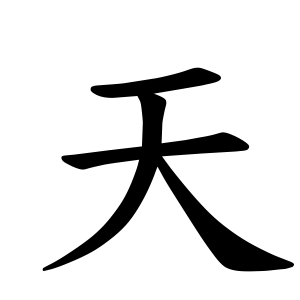天
- sky;
- heaven;
Etymology
Originally, its Korean pronunciation was "t’yen" (텬). As shown in historical charts, other East Asian languages besides Korean still retain a "t" or "th" sound. In Korean, the pronunciation shifted from “ᄐ” to “ᄎ” through palatalization, to better suit the Korean phonetic system, which has many final consonants.
天 was originally a semantic indicator emphasizing the head of a person—a symbol of a leader or the top. Over time, starting from the Zhou dynasty, its meaning expanded from “chief” or “highest” to “sky” or “heaven.”
In oracle bone script, contrary to some incorrect depictions, the original form was a person with a head, not a person with four arms.
Another interpretation claims that 天 is composed of two horizontal lines (二) and 人 (person), symbolizing the harmony between heaven, earth, and humanity, representing nature. However, this theory is unsupported by actual oracle bone script evidence and is considered speculative.
It’s also notable that 天 is the first character in the classic Chinese text Thousand Character Classic (천자문).
Semantic development:
- Physical sky;
- Heaven (cosmic force);
- Divine will;
- Fate / destiny;
- Day (as time unit).
Usage in Korean
In East Asian thought, 天 is one of the most fundamental concepts, deeply rooted in the belief systems of ancient China. To fully understand it, one must look back as far as the Shang dynasty.
Originally, 天 referred to a deity or divine being. Over time, it took on the broader meaning of the "natural order" or "universal principle", an attribute of the supreme god. This shift is reflected in Buddhist scriptures translated into Chinese, where Hindu deities are described using the term 天.
According to Shuowen Jiezi (an ancient Chinese dictionary), 天 was formed by placing the stroke 一 ("one") over a figure similar to 大 ("person"), indicating "what is above a person" — hence, "heaven."
As such, 天 represents the yang (陽) principle, in contrast with 地 (earth), which symbolizes yin (陰). This symbolic opposition led to the conceptual merger of heaven and deity: "heaven = god."
It reflects Confucian ideals of the Mandate of Heaven (天命) — the belief that only heaven is above humanity, and all people equally bear a divine mission. If a government acts unjustly, heaven sends warnings through natural disasters or turmoil. Conversely, the appearance of a sage emperor (聖天子) is foretold by rare animals like white-furred beasts.
Due to the vast and powerful meaning of 天, it was traditionally avoided in personal names, as it was believed that invoking such cosmic or divine characters could invite misfortune. This applied not only to 天, but to any character representing nature or the universe.
However, in modern times—where such traditional beliefs have faded—天 is now commonly used in names, often conveying positive, lofty meanings.
Additional notes
In East Asian thought, 天 is one of the most fundamental concepts, deeply rooted in the belief systems of ancient China. To fully understand it, one must look back as far as the Shang dynasty.
Originally, 天 referred to a deity or divine being. Over time, it took on the broader meaning of the "natural order" or "universal principle", an attribute of the supreme god. This shift is reflected in Buddhist scriptures translated into Chinese, where Hindu deities are described using the term 天.
According to Shuowen Jiezi (an ancient Chinese dictionary), 天 was formed by placing the stroke 一 ("one") over a figure similar to 大 ("person"), indicating "what is above a person" — hence, "heaven."
As such, 天 represents the yang (陽) principle, in contrast with 地 (earth), which symbolizes yin (陰). This symbolic opposition led to the conceptual merger of heaven and deity: "heaven = god."
It reflects Confucian ideals of the Mandate of Heaven (天命) — the belief that only heaven is above humanity, and all people equally bear a divine mission. If a government acts unjustly, heaven sends warnings through natural disasters or turmoil. Conversely, the appearance of a sage emperor (聖天子) is foretold by rare animals like white-furred beasts.
Due to the vast and powerful meaning of 天, it was traditionally avoided in personal names, as it was believed that invoking such cosmic or divine characters could invite misfortune. This applied not only to 天, but to any character representing nature or the universe.
However, in modern times—where such traditional beliefs have faded—天 is now commonly used in names, often conveying positive, lofty meanings.
Derived characters
Variant characters include 兲 and 𠀡.
Words that derived from 天
- 노천(露天)–open air; outdoor
- 만천하(滿天下)–whole world
- 선천(先天)–innateness; inbornness
- 승천(昇天)–ascension
- 용비어천가(龍飛御天歌)–Yongbieocheonga
- 입천장(입天障)–palate; roof of the mouth
- 천국(天國)–heaven
- 천륜(天倫)–moral laws in family relationships; kinship; consanguinity
- 천리(天理)–law of nature
- 천문학(天文學)–astronomy
- 천벌(天罰)–divine punishment; retribution
- 천사(天使)–angel
- 천상(天上)–celestial; heaven
- 천성(天性)–personality
- 천연(天然)–naturalness
- 천일국(天一國)–Cheon Il Guk
- 천장(天障)–ceiling
- 천적(天敵)–natural enemy
- 천주(天宙)–Cheonju
- 천주평화연합(天宙平和聯合)–Universal Peace Federation
- 천지(天地)–world; being full of
- 천지개벽(天地開闢)–creation of the world; big change
- 천체(天體)–celestial body
- 천하(天下)–world; rule; dominance; being second-to-none
- 천하무적(天下無敵)–invincibility
- 천하장사(天下壯士)–strong person
- 一大 (MK)
- ⿱ 一 大
